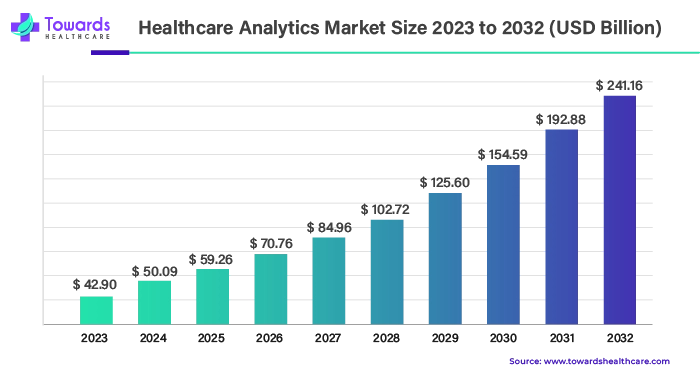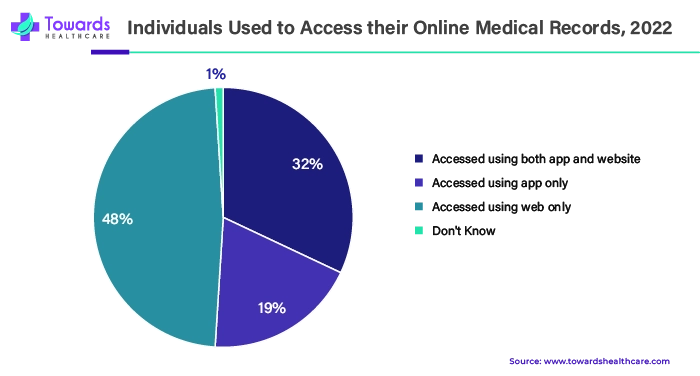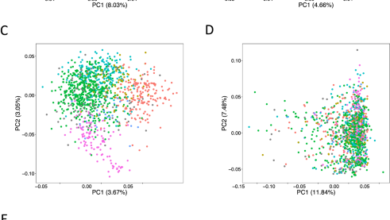Healthcare Analytics Market Size to Worth USD 241.16 Bn by 2032


The global healthcare analytics market size is calculated at USD 50.09 billion in 2024 and is estimated to be worth around USD 241.16 billion by 2032, growing at a solid CAGR of 19.1% from 2024 to 2032.
Ottawa, May 27, 2024 (GLOBE NEWSWIRE) — The global healthcare analytics market size reached USD 42.90 billion in 2023 and is predicted to hit around USD 192.88 billion by 2031, a study published by Towards Healthcare a sister firm of Precedence Research.


To access the sample report of healthcare analytics market growth and projections in detail, Click here @ Access the Healthcare Analytics Market Sample Report Here
Report Highlights:
-
Software components being largely used dominated the market with a 60% market share in 2023.
-
Clinical applications reported the largest market share with 40% in 2023.
-
Healthcare providers dominated the market in 2023 with a 40% market share.
In 2021, there was a noticeable surge in demand for Electronic Health Record (EHR) systems, propelled by the growing uptake among office-based physicians. According to data from the Centers for Disease Control and Prevention, 88.2% of office-based physicians were using an EHR system, with 77.8% having a certified system.
Healthcare analytics involves data analysis tools and techniques to gain insights from healthcare data. It encompasses collecting, processing, and interpreting vast amounts of healthcare-related information to improve decision-making, enhance patient care, and optimize operational efficiency within healthcare organizations. Healthcare analytics helps stakeholders, including healthcare providers, administrators, insurers, and policymakers, make informed decisions by identifying patterns, trends, and correlations within data. This data can come from various sources, such as electronic health records (EHRs), medical imaging, patient demographics, billing records, and clinical trials.
The importance of healthcare analytics lies in its ability to drive evidence-based decision-making, enabling healthcare organizations to enhance patient outcomes, prevent diseases, and develop personalized treatment plans based on individual patient needs. Healthcare analytics play a crucial role in population health management, enabling healthcare providers to identify and address health disparities, monitor disease outbreaks, and implement preventive interventions on a larger scale. Healthcare analytics contributes to regulatory compliance by ensuring adherence to healthcare standards and guidelines, improving patient safety and quality of care. It also supports risk management and fraud detection by identifying anomalies and irregularities in billing and claim data.
You can place an order or ask any questions, please feel free to contact us at sales@towardshealthcare.com
Healthcare Analytics Advancements Enable Tracking Daily Routines Effectively
Healthcare is super high-tech, with remarkable technologies and digital tools popping up everywhere. You know those old paper charts your doctor used to keep? They’ve gone digital, becoming Electronic Health Records (EHRs). These EHRs hold all sorts of details about your medical history, like what illness you’ve had, what medicines you take, and even your lab test results.
For instance,
-
In January 2021, Optum, Inc. partnered with Change Healthcare to enhance its technology-driven healthcare platform. Both firms offer consumers data analytics solutions, software, and advanced technology platforms for healthcare.
But wait, there’s more! Have you seen those fancy watches people wear that can track their steps and heartbeats? Those are called wearable devices. They keep tabs on things like how much you move, how well you sleep, and even your blood sugar level, and all of that info can be sent straight to your doctor!


And then there’s the Internet of Things (IoT), which sounds super fancy but is just about connecting everyday objects to the Internet. In healthcare, this means stuff like blood pressure monitors, glucose meters, and pill dispensers that can talk to your doctor. They collect data and shoot it over to the folks in charge of keeping you healthy. All the data might sound pretty, but it is also overwhelming. Imagine trying to make sense of a million puzzle pieces all at once! That’s where healthcare analytics comes in. It’s like having a supersmart computer buddy who can sort through all that data and find the important stuff.
With healthcare analytics, doctors and hospitals can spot trends in how people are getting sick, like if there’s suddenly a bunch of flu cases in one area. They can also predict if someone might end up back in the hospital after surgery, so they can step in early and prevent it from happening. But it’s not just about fixing problems. Healthcare analytics also helps make things run smoother, like finding where things are getting jammed up in the emergency room or figuring out how to get patients out of the hospital faster. And remember all those rules about keeping your medical info safe and private? Healthcare analytics helps with that, too, ensuring everything stays secure and follows the rules.
One cool thing about healthcare analytics is that it can personalize treatment just for you. By looking at your genes, health habits, and other details, the doctor can personalize the treatments to fit you like a glove, ensuring you get the best care possible.
For any customization in healthcare analytics market report to match your specific needs, Click here @ Customize Healthcare Analytics Market Report Here
Governments Set Rules; Providers Use Analytics for Better Care
Governments worldwide are making rules and requirements to ensure that healthcare providers give high-quality care to patients and use money wisely. These rules often include reporting on how well healthcare services are doing and getting paid based on how good their care is rather than just how many patients they see.
For instance,
-
In May 2021, the World Health Organization (WHO) collaborated with a German federal agency to create a central hub for pandemic data. This hub aims to analyze disease spread, promote medical advancements, and monitor patients to effectively prevent future risks.
To follow these rules and get paid properly, healthcare providers need to keep track of a lot of information about their patients and the care they provide. This is where analytics solutions come in. Analytics means using computers to look at all the information and find important patterns or insights that can help improve patient care and make healthcare services more efficient.
So, because governments are making these rules and healthcare providers want to do a good job and get paid properly, they are increasingly using analytics solutions to help them keep track of everything and make better decisions about patient care.
Healthcare Analytics Guides Professionals to Make Better Decisions
In healthcare, a vital tool known as healthcare analytics plays a pivotal role in guiding doctors and other professionals toward more informed decision-making. Picture it like this: if you were solving a puzzle, instead of relying on guesswork, you have a detailed map showing you the most efficient route. Healthcare analytics serves as this map, offering a comprehensive overview of patient conditions, treatment outcomes, and hospital operations.
Healthcare analytics delves into past treatments and patient responses, akin to examining a collection of stories to discern the outcomes. By analyzing this data, doctors can forecast which treatments will likely be most effective for individual patients. This predictive capability enables healthcare providers to make smarter decisions from the outset rather than resorting to trial and error.
Healthcare analytics enhances decision-making processes by providing insights akin to planning a large gathering. Rather than estimating food and beverage quantities, one would assess the number of attendees and their preferences. Similarly, healthcare analytics assists hospitals and clinics in making informed choices about patient care.
For instance,
Healthcare analytics contributes to streamlining operations within healthcare facilities, organizing a room for optimal efficiency. It assists in tasks such as staff scheduling to ensure adequate patient care and efficient equipment utilization, thereby minimizing waste. This organized approach allows hospitals to function smoothly, maximizing resource allocation and efficiency.
Complexity in Data Creates Problems
Imagine you’re trying to solve a puzzle, but some pieces need to be included or corrected. Similarly, in healthcare analytics, we try to understand important information from data, but sometimes, the data needs to be corrected or completed, making it like a puzzle with missing pieces. Healthcare data comes from electronic health records, medical devices, and administrative systems. Each source has its own way of organizing information, which can lead to errors or inconsistencies.
For instance,
When we analyze this data, if it needs to be more accurate or complete, we might come up with the wrong conclusion. This can affect how doctors treat patients, how hospitals run, and how decisions are made about healthcare policies. To ensure the data is of good quality, we need to do a few things: ensure that the data is accurate and matches what it should be. We also need to make sure the data is organized consistently so that it’s easy to analyze. We need to keep an eye on the data over time to make sure it stays accurate and up-to-date.
By doing all of these things, we can ensure that the data we use for healthcare analytics is reliable and helps us make better decisions for patients and the healthcare system.
Geographical Landscape
North America is a hub for technological innovation, with a thriving ecosystem of healthcare IT companies, research institutions and startups. This fosters the development of innovative analytics solutions customized to the needs of healthcare providers, payers and other stakeholders. Advanced technologies such as artificial intelligence (AI), machine learning, and big data analytics are increasingly integrated into healthcare analytics platforms to unlock actionable insights from vast datasets. Regulatory frameworks, including healthcare privacy laws such as the Health Insurance Portability and Accountability Act (HIPAA) in the United States and similar regulations in Canada, significantly shape the healthcare analytics market.
In Asia Pacific, healthcare analytics has a lot of potential because the region has a large population and diverse healthcare systems. Countries like China and India are investing more in healthcare technology, which creates opportunities for companies that provide healthcare analytics solutions. This market is growing because more hospitals and healthcare companies are realizing the importance of using data to make better decisions about patient care, treatments and how hospitals are run. It’s similar to how businesses use data to understand customers and improve their products or services.
Competitive Landscape
The competitive landscape in the healthcare analytics market is dynamic, with companies constantly innovating and evolving their offerings to stay ahead of the competition. Different companies compete to offer the best tools and services to help hospitals and healthcare providers make sense of their data. It’s like a race where companies try to outdo each other to provide the most effective solutions for analyzing healthcare data. The big IT companies offer various tools and services, such as software platforms, data analysis algorithms, and consulting services, all aimed at helping healthcare providers make better decisions based on their data. It’s similar to how different brands compete to offer the best smartphones or computers, but in this case, it’s about healthcare technology.
Browse More Insights of Towards Healthcare:
-
The global brain implants market was valued at USD 5.85 billion in 2022 and is projected to reach around USD 14.24 billion by 2032, expanding at a CAGR of 9.3% between 2023 and 2032.
-
The global lung disease therapeutics market size was valued at USD 81.2 billion in 2022 and is projected to hit around USD 146.1 billion by 2032, growing at a CAGR of 6.1% from 2023 to 2032.
-
The global genomics market size to grow from USD 28.9 billion in 2022 to reach around USD 127.16 billion by 2032, registered at a CAGR of 16.1% between 2023 and 2032.
-
The global non-oncology precision medicine market size was at USD 70.16 billion in 2022 and is projected to surpass around USD 163.5 billion by 2032, growing at a CAGR of 8.7% from 2023 to 2032.
-
The global non-invasive blood glucose monitoring system market size to grow from USD 21.76 million in 2022 to reach around USD 202.73 million by 2032, at 25.0% CAGR between 2023 and 2032.
-
The global animal vaccine market was estimated to grow from USD 14.27 billion in 2022 to soar an estimated USD 36.91 billion by 2032, at 10% CAGR between 2023 and 2032.
-
The global pancreatic cancer market size was at USD 2.05 billion in 2022 and is projected to reach around USD 7.4 billion by 2032, expanding at a CAGR of 13.7%.
-
The global 3D Printed prosthetics market size is estimated to grow from USD 1.54 billion in 2022 and is projected around USD 3.28 billion by 2032, expanding at a 7.9 % of CAGR between 2023 and 2032.
-
The global anesthesia monitoring devices market size to grow from USD 2.41 billion in 2022 to reach around USD 5.96 billion by 2032, growing at a CAGR of 9.5% between 2023 and 2032.
-
The global diabetes drugs market was valued at USD 61.87 billion in 2022 and is projected around USD 118 billion by 2032, growing at 6.7% CAGR for 2023 to 2032.
Recent Developments
-
In March 2022, Microsoft introduced Microsoft Cloud for Healthcare, aiming to facilitate improved communication and insights between patients and healthcare providers, ultimately enhancing patient care.
-
In August 2022, Syntellis Performance Solutions purchased Stratasan, an innovative healthcare market intelligence and data analytics firm. This acquisition enables Syntellis Performance Solutions to broaden its range of solutions for healthcare organizations by incorporating data and intelligence tools to enhance financial, strategic, and operational growth planning.
-
In June 2022, Oracle acquired Cerner Corporation, blending Cerner’s clinical expertise with Oracle’s analytics, automation proficiency, and enterprise platform.
Market Players
Market Segments
By Component
By Type
-
Descriptive
-
Predictive
-
Prescriptive
By Application
By Delivery Mode
-
Web Hosted
-
Cloud-based
-
On-premises
By End User
-
Life Science Companies
-
Healthcare Payers
-
Healthcare Providers
By Geography
-
North America
-
Europe
-
Asia Pacific
-
Middle East and Africa
-
South America
Acquire our comprehensive analysis today @ https://www.towardshealthcare.com/price/5141
You can place an order or ask any questions, please feel free to contact us at sales@towardshealthcare.com
Gain access to the latest insights and statistics in the healthcare industry by subscribing to our Annual Membership. Stay updated on healthcare industry segmentation with detailed reports, market trends, and expert analysis tailored to your needs. Stay ahead of the curve with valuable resources and strategic recommendations. Join today to unlock a wealth of knowledge and opportunities in the dynamic world of healthcare: Get a Subscription
About Us
Towards Healthcare is a leading global provider of technological solutions, clinical research services, and advanced analytics to the healthcare sector, committed to forming creative connections that result in actionable insights and creative innovations. We are a global strategy consulting firm that assists business leaders in gaining a competitive edge and accelerating growth. We are a provider of technological solutions, clinical research services, and advanced analytics to the healthcare sector, committed to forming creative connections that result in actionable insights and creative innovations.
Browse our Brand-New Journals:
https://www.towardspackaging.com
https://www.towardsautomotive.com
Web: https://www.precedenceresearch.com
For Latest Update Follow Us: https://www.linkedin.com/company/towards-healthcare
Get Our Freshly Printed Chronicle: https://www.healthcarewebwire.com





